 Kramer in court by La Tercera
Kramer in court by La TerceraDrugs, Fans and Chilean Football
Top Local Club Hit by Police Undercover Operation
An important sports promoter and the leader of an organized fan club linked to "Universidad de Chile", one of the country's most popular clubs have been arrested in connection with a drug trafficking organization. Jorge Barrera (35) and Claudio Hernandez (aka Kramer) were arrested on Nov. 16 in Santiago by officers of Chile´s "Investigaciones" (civilian police ). The plain clothed officers intercepted the two men in a car, and discovered a bag of 12 "Extasis" pills, cocaine and US$10,000 in cash. During the trial, the police officers stated that Barrera had dropped the Extasis pills to the ground, in order to deny responsability. The police also also stated that according to interceptions of mobile phone calls between the two accused Barrera wanted to buy from Kramer dosis of Extasis worth US$ 400. Jorge Barrera is the C.E.O of "Mercom", a company that specializes in sports marketing and representing professional football players. For the past four years , Mercom has been in charge of hiring players for "Universidad de Chile", such as Marcelo Salas, that was transferred in 2005 from River Plate of Argentina. Also several Colombian footballers such as Faustino Asprilla (that played for Parma (Italy) and Newcastle United among others), Mayer Candelo and Harly Alcazar arrived at Universidad de Chile after being hired by Mercom. Also Barrera has been responsible for transferring Chilean footballers such as Hugo Droguett to the Mexican league, where it seems he has good contacts. During the court hearing on Nov.21, Barrera was set free on bail for US$2000 after his lawyer argued that Barrera had to travel to Mexico for an important business meeting. The Judge allowed Barrera to travel to Mexico but he must return to Chile within ten days, after which he must report every week to Santiago police.
"He was in the wrong place at the wrong time. Kramer had promised Barrera to give him some tickets to the next Universidad de Chile match," said Rainiero Garcia, Barrera´s lawyer.
Claudio Hernandez, or "Kramer" as he is called by his friends, is one of the founding members of an organized fan club called "Los de Abajo", whose main activity is to support the club during matches. Kramer has had several criminal convictions such as carrying firearms, assault with bodily harm, damages to private property and now it seems he is linked to a drug trafficking organization that deals in "Extasis", an illegal drug that is sold for US$30 per pill in the Chilean market. After the trial, Kramer was sent into custody at Santiago´s “Maximum Security jail”.
"If a police officer is arrested for corruption, is all the Police force corrupt? Kramer may have made a mistake, but not all our fans are to blame," said "Anarkia", another leader of "Los de Abajo" during a TV interview.
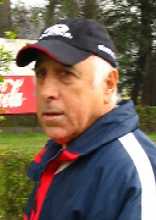
ADIOS TO COACH NELSON ACOSTA
The friendly match played on Nov.15 between Chile and Paraguay was a good occasion to bid farewell to Nelson Acosta, coach of the national football team since 1996. As in other parts of the world many South American national teams used the occasion to prepare for future tournaments, such as the "Copa America" (South American Nations Cup) and the qualifying matches for the 2010 World Cup. The venue was the Sausalito Stadium in Vina del Mar, a ground that was incidentally built for the 1962 World Cup held in Chile.
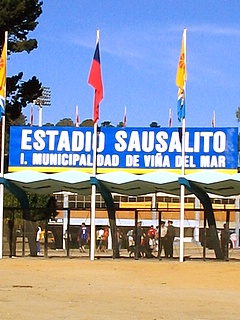
The match itself could be used as a parallel for Nelson Acosta´s career as national team coach , full of ups and downs, with moments of glory and despair. By the first ten minutes of the second half, Chile was winning by 3-0, but in the next five minutes Paraguay scored twice, causing disapproval among the nearly 12,000 fans that showed up at the Sausalito. Near the end of the first half, Mauricio Pinilla,a striker with Hearts in the Scottish Premier league, had to be replaced since he had a muscle injury, a hard blow for Pinilla that is trying to recover his form and settle down to his new club.
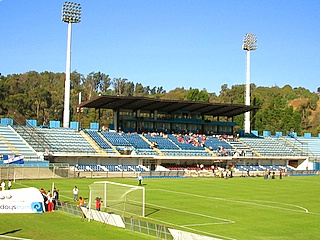
However Chile managed to hang on and the man of the match was Jorge Valdivia,that scored the third goal and is currently playing for Palmeiras in the Brazilian First division.
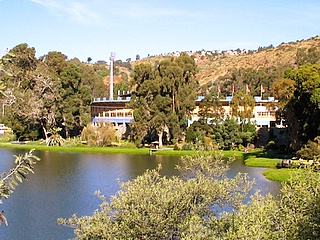
Nelson Acosta was in fact born in Uruguay, and began his football career with Penarol, one of that country´s top clubs. In 1977 he moved to Chile where he played for Everton, O' Higgins and Fernandez Vial. Acosta began coaching with Fernandez Vial in 1984 and then continued with O'Higgins. In 1992 he began coaching Union Espanola, and led this club to be Chilean champions in 1993 and 1994. In 1996 Acosta had his first internacional success as he took Union Espanola to quarterfinals of the Copa Libertadores, the most important South American club tournament. Acosta had made himself a name at international level and in June 1996, he was brought in as a replacement for Xavier Azkargorta, Chile´s national team coach that was taking part in the qualifying rounds for the 1998 World Cup in France. Azkargorta had an awful campaign, and received violent criticism from the fans and press.
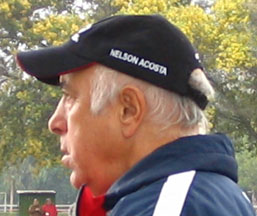
In Acosta´s first match in Santiago, Chile defeated Paraguay by 4-1 (ironically the same team he would face in his farewell match in 2006) and Acosta was hailed as a savior. Acosta managed to lead Chile to qualify for France 98, where the national team had a mediocre performance with draws against Italy (2-2), Austria (1-1) and Cameroon (1-1). In the next round Brazil (4-1) knocked Chile out of the competition and Acosta received some criticism by the press for not preparing for this match, since he took the players to a shopping center some hours before. It seems that Acosta had been satisfied with his performance and thought that he had done as much as he could. However, the Chilean Football Federation (ANFP) renewed his contract and Acosta continued as coach, this time with the responsibility of qualifying Chile to the 2002 World Cup in Korea and Japan. In 2000 Acosta qualified Chile to the Olympic Games in Sydney, Asutralia, where his team won the bronze medal. Then came the responsibility of qualifying Chile to the 2002 World Cup in Korea and Japan, that ended in disaster. In 2001, after a string of disappointing results, Acosta was replaced by a succession of two other coaches, but the national team was already in chaos and Chile did not qualify. During the qualifiers for Germany 2006, the starting coach was Juvenal Olmos, that also had a poor performance and so with a third of the matches left, Nelson Acosta was brought in as an emergency option. Acosta did raise the hopes among the fans with some positive results, but Olmos had already left Chile too far down the points ladder, and the gap with the other teams was made it impossible for Acosta to catch up. With the recent election of a new ANFP president, Harold Mayne-Nicholls, Acosta sensed he was not in Mayne-Nicholl´s plans and presented his resignation. To Acosta´s credit it can be said that he did qualify his adopted country to a World Cup, was very well liked by many players but hated by others, a fitting end to a respectable career.
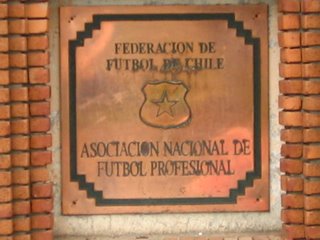
Journalist Elected Head of Chilean Football
Harold Mayne-Nicholls Promises to Put House in Order
On Nov. 3, with an absolute majority of 47 votes in favor and one abstention, Harold Mayne-Nicholls was elected as new the President of Chile´s Football Federation (www.anfp.cl) for the next four years. The most important task for Mayne-Nicholls will be to recover Chilean football and put it back where it deserves to be. The finest moment for Chilean football was during 1950 to 1960, when the country had the most competitive league in South America and climaxed in 1962 when FIFA appointed Chile to host the fifth edition of the World Cup. New stadiums were built specially for the occasion and the home team got a respectable third place, after Brazil that won the event. Since then, very few stadiums have been built, and the current infrastructure is in decay. Also crowd violence has driven out many fans from going to see matches, which has had an impact on the revenues of professional clubs. The last time Chile qualified for a World Cup was in 1998 and since then the fans have seen a string of disappointing result. Compared to the rest of the South American nations, Chile has quite a balanced economy, as was proven during the qualifying matches for Germany 2006, where Chile had highest spectator attendance record in the continent. This means that the fans have money to spend to go and see matches, but who will want to go if they are in danger of being attacked by hooligans and will be seated in uncomfortable stadiums? This is precisely what Harold Mayne-Nicholls wants to change. During a recent TV interview, the new president of Chile´s football promised to "show zero tolerance with hooligans, a prosecuting office will be set up to punish these people that only want to cause destruction. If they want to make trouble, they will have to go somewhere else."
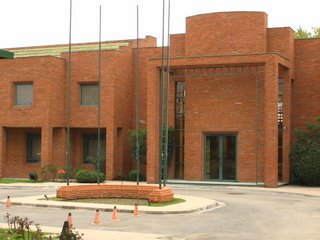
The main pillars of Mayne-Nicholls modernization plan will be :
1) After carrying out opinion polls among the fans, a new tournament system for the first division will begin in 2008. Since Chile has such a vast territory, some teams must travel thousands of kilometers to play official matches. An idea is to divide the teams into North , Central and Southern groups from which the best teams will move on to a play-off stage.
2) A Director for the National Team will be appointed, whose task will be to oversee development of the players from youth to adult level.It seems most probable that current coach Nelson Acosta will not continue, since Mayne-Nicholls favors Manuel Pellegrini, that is the coach of Villarreal in the Spanish first division.
3) Stamp out violence from stadiums and improve its infrastructure. Chile will honor its commitment to stage the U-20 Women's World Cup in 2008.
Harold Mayne-Nicholls was born in 1961 and has an impeccable career as a football official. Mayne-Nicholls is a graduate in journalism from Chile´s Catholic University, and his first job was as an official of the University's professional football team, one of the most popular in the country. After a spell in the South American Football Federation (Conmebol), Mayne-Nicholls moved up the ranks and joined FIFA , the world's most important sports institution. During the past World Cup, Mayne-Nicholls was in charge of organizing the opening ceremony and the matches in Munich. At present he is also in charge of FIFA´s Goal Project for South America.














No comments:
Post a Comment